人教新版+九年级英语7单元教案
- 格式:doc
- 大小:220.50 KB
- 文档页数:15
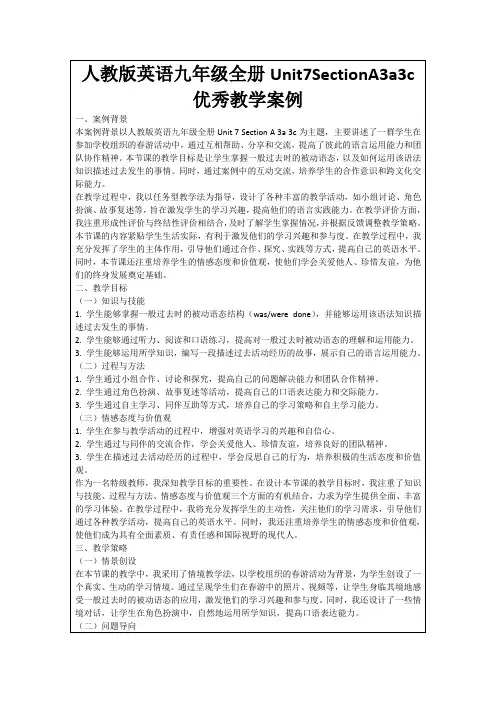
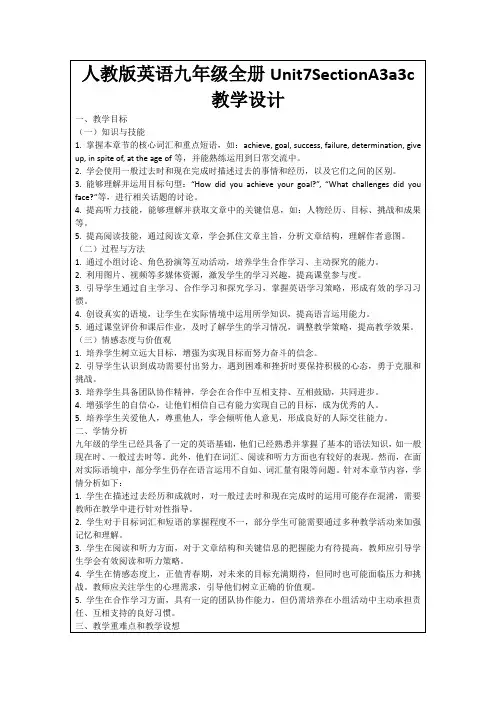
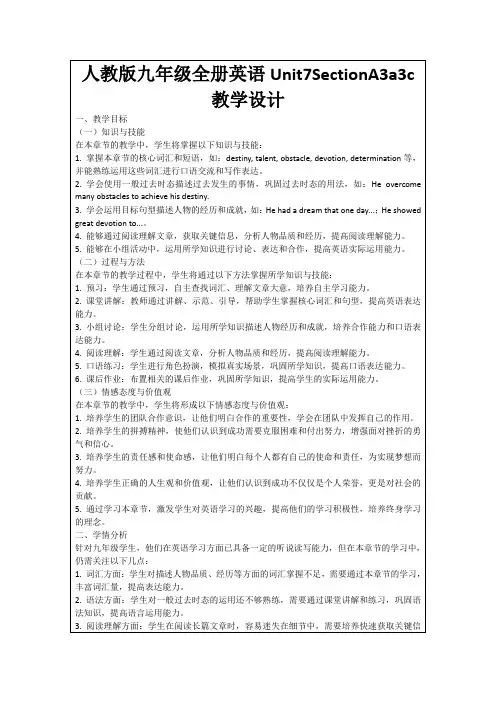
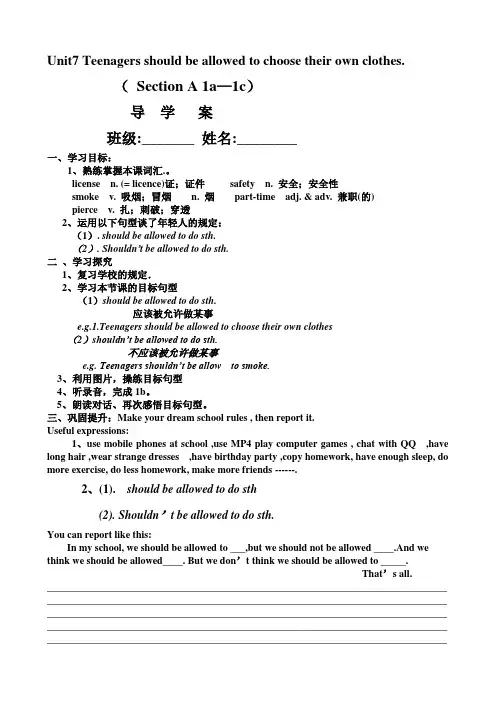
Unit7 Teenagers should be allowed to choose their own clothes.(Section A 1a—1c)导学案班级:_______ 姓名:________一、学习目标:1、熟练掌握本课词汇.。
license n. (= licence)证;证件safety n. 安全;安全性smoke v. 吸烟;冒烟n. 烟part-time adj. & adv. 兼职(的)pierce v. 扎;刺破;穿透2、运用以下句型谈了年轻人的规定:(1). should be allowed to do sth.(2). Shouldn’t be allowed to do sth.二、学习探究1、复习学校的规定.2、学习本节课的目标句型(1)should be allowed to do sth.应该被允许做某事e.g.1.Teenagers should be allowed to choose their own clothes(2)s houldn’t be allowed to do sth.不应该被允许做某事e.g. Teenagers shouldn’t be allow to smoke.3、利用图片,操练目标句型4、听录音,完成1b。
5、朗读对话、再次感悟目标句型。
三、巩固提升:Make your dream school rules , then report it.Useful expressions:1、use mobile phones at school ,use MP4 play computer games , chat with QQ ,have long hair ,wear strange dresses ,have birthday party ,copy homework, have enough sleep, do more exercise, do less homework, make more friends ------.2、(1). should be allowed to do sth(2). Shouldn’t be allowed to do sth.You can report like this:In my school, we should be allowed to ___,but we should not be allowed ____.And we think we should be allowed____. But we don’t think we should be allowed to _____.That’s all.________________________________________________________________________________ ________________________________________________________________________________ ________________________________________________________________________________ ________________________________________________________________________________ ________________________________________________________________________________。
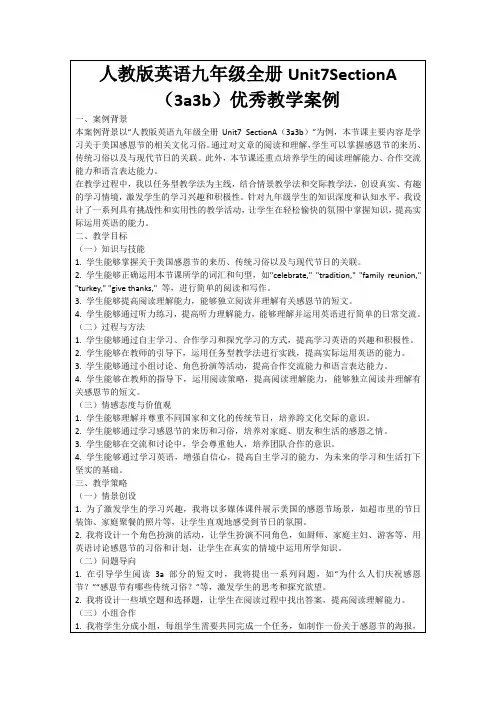
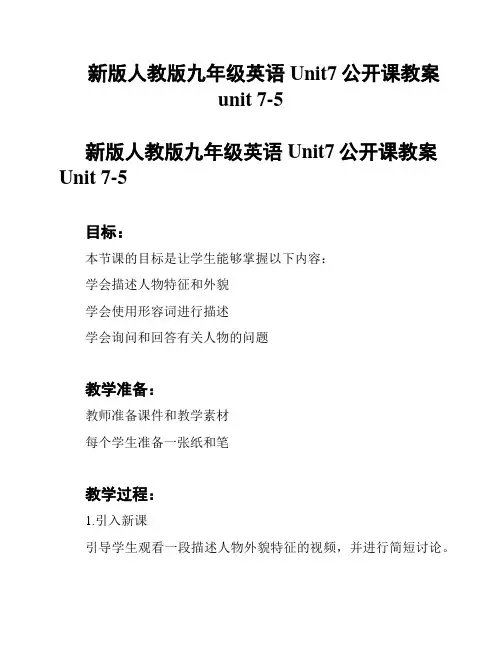
新版人教版九年级英语Unit7公开课教案unit 7-5新版人教版九年级英语Unit7公开课教案Unit 7-5目标:本节课的目标是让学生能够掌握以下内容:学会描述人物特征和外貌学会使用形容词进行描述学会询问和回答有关人物的问题教学准备:教师准备课件和教学素材每个学生准备一张纸和笔教学过程:1.引入新课引导学生观看一段描述人物外貌特征的视频,并进行简短讨论。
提问学生是否知道如何用形容词来描述人物的外貌,激发学生兴趣。
提出本课的主题和目标,预告将要学习的内容。
2.学习单词和短语教师呈现人物外貌特征相关的单词和短语。
例如:tall。
short。
long hair。
etc。
通过图片和动画帮助学生理解和记忆新词汇。
3.练习描述人物分发纸和笔给每个学生,让他们画出一个自己心目中的人物形象,并在旁边使用所学的形容词描述。
学生互相交换纸张,并尝试通过描述猜测对方所画的人物。
4.模仿对话教师示范一段询问和回答有关人物的问题的对话。
学生们分组,自行编写对话并进行模仿演练。
5.小结反思教师向学生总结本节课所学的内容,并强调重点。
提供额外练习材料,并告知学生下次课前需要复习的内容。
作业:要求学生写一篇短文,描述自己或一个虚构的角色的外貌特征。
要求使用至少五个形容词进行描述。
参考资料:人教版九年级英语教材相关网络资源和图片注意事项:教师要根据学生的实际情况和课堂进展合理安排教学时间。
鼓励学生积极参与互动和讨论,提高口语表达能力。
教师要引导学生进行自主学习和思考,促进他们的主动性和创造力。
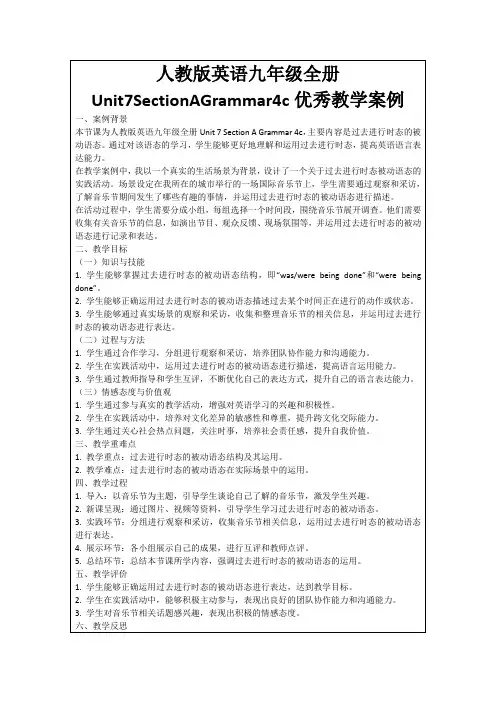
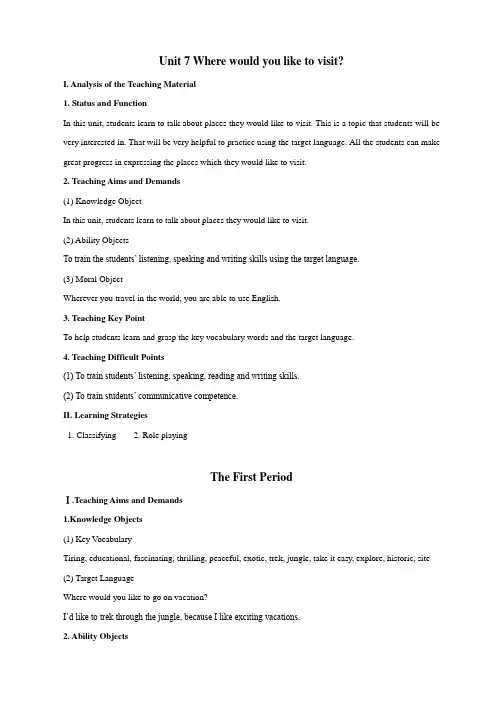
Unit 7 Where would you like to visit?I. Analysis of the Teaching Material1. Status and FunctionIn this unit, students learn to talk about places they would like to visit. This is a topic that students will be very interested in. That will be very helpful to practice using the target language. All the students can make great progress in expressing the places which they would like to visit.2. Teaching Aims and Demands(1) Knowledge ObjectIn this unit, students learn to talk about places they would like to visit.(2) Ability ObjectsTo train the students’ listening, speaking and writing skills using the target language.(3) Moral ObjectWherever you travel in the world, you are able to use English.3. Teaching Key PointTo help students learn and grasp the key vocabulary words and the target language.4. Teaching Difficult Points(1) To train students’ listening, speaking, reading and writing skills.(2) To train students’ communicative competence.II. Learning Strategies1. Classifying2. Role playingThe First PeriodⅠ.Teaching Aims and Demands1.Knowledge Objects(1) Key V ocabularyTiring, educational, fascinating, thrilling, peaceful, exotic, trek, jungle, take it easy, explore, historic, site (2) Target LanguageWhere would you like to go on vacation?I’d like to trek through the jungle, because I like exciting vacations.2. Ability Objects(1)Train students to talk about places they would like to visit with the target language.(2)Train students to describe vacations with different adjectives. (3)Train students’ listening skill.3. Moral Object, It′s more interesting to go on vacating somewhere instead of staying at home.Ⅱ. Teaching Key Points1. Key VocabularyTiring, educational, fascinating, thrilling, peaceful, exotic, trek, jungle, take it easy, explore, historic, site 2. Target Language Talk about different places with the target language.Ⅲ. Teaching Difficult Points1. Describe vacations with different adjectives.2. Talk about different places with the target language. IV. Teaching ProceduresStep Ⅰ Revision Revise the language points in Unit 6.Step Ⅱ 1a1. Introduce the key vocabulary.2. Show the new vocabulary words on the blackboard:tiring ad.引起疲劳的;累人的educational ad.教育的;有教育意义的fascinating ad.迷人的;有极大吸引力的thrilling ad.令人激动的;令人震颤的peaceful ad.平静的;宁静的;和平的exotic ad.外(国)来的;外国产的trek v.(缓慢或艰难地)旅行;长途跋涉jungle n.热带丛林;密林take it easy 从容;轻松;不紧张explore v.探险;考察historic ad.历史上著名的;历史上有重大意义的site n.地方;场所3. Point to the words and teach students to read them several times till they can pronounce the words fluently and correctly.4. Read the instructions to the students. Be sure that everyone knows what to do.5. Tell students to look at the posters in the picture and compare them.6. Ask students to say what place they would like to visit and why they want to go there.Step III SummaryIn this class, we’vet learned so me adjectives that are used to describe vacations and some other words. We have also learned the target language—Where would you like to go on vacation? I’d like to trek through the jungle because I like exciting vacations.Step IV Homework1. Try to remember the new key vocabulary.2. Finish the exercise of period 1.Step V Blackboard DesignUnit 7 Where would you like to visit?Section APossible answers to Activity 1a:Vacation 1: relaxing, peaceful, boringVacation 2: exciting, tiring, dangerous, educational, fascinating, interesting, fun,thrilling, exoticVacation 3: exciting, educational, peaceful, interestingThe Second PeriodⅠ. Teaching Aims and Demands1. Knowledge Objects(1) Key V ocabulary Fall, Niagara Falls(2) Target Language Where would you like to visit? I’d like/hope to visit/see…I’d like/love places where…2. Ability Objects(1)Train students’ listening skill.(2) Train students’ communicative competence.3. Moral Object It can make you know more about the world to travel much.Ⅱ. Teaching Key Points1. New words fall, Niagara Falls2. Listening practice with target language3. Make communications with target languageⅢ. Teaching Difficult Points1. Train students’ l istening practice with target language.2. Help students to make communications with target language.Ⅳ. Teaching Methods1. Listening2. Pair works3. ExplanationⅤ. Teaching Aids1. A tape recorder2. Some pictures of Hawaii, Mexico and Niagara FallsⅥ. Teaching ProceduresStep Ⅰ RevisionRevise the target language by askingStep Ⅱ Grammar FocusPresent ate the conversation below by saying to the students and writing it on the blackboard:Where would you like to visit?I’d like to go somewhere relaxing.Draw a line under the word relaxing.Then ask the children the same questions and tell them to answer in their own words. For example,I’d like to go somewhere interesting.After asking several students to give answers with different adjectives, get them to practice in pairs. Each pair makes two conversations.Next ask several pairs to share their conversations with the class.Then say, the adjectives usually come before the nouns, such as, an educational vacation, a tiring trip. But in the sentences which are using the word something or somewhere, the adjective should be put after the pronouns. For example:I’d like to go somewhere fascinating.I’d love to eat something delicious.Step III SummaryIn this class, we’vet done some listening practice with target language. We have also practiced our oral English in pairs. And we’vet discussed something on grammar.Step IV HomeworkMemorize the new words of unit 7 and finish some exercise.Step V Blackboard DesignUnit 7 Where would you like to visit?Section AGrammar Focus:1. Where would you like to visit? I’d like to go somewhere relaxing.2. Where would you like to visit? I hope to go to France some day.The Third PeriodⅠ. Teaching Aims and Demands1. Knowledge Objects(1) Key V ocabularyTouristy, spotlight" Singapore, beautiful, heavy, private, downtown, get around, pack, light(2)Target LanguageWhere would you like to go, Kathy? I’d like to vis it Kunming.2. Ability Objects(1) Train students’ reading skill.(2) Train students’ skill of communication.3. Moral ObjectShare your experience on traveling in a city with your classmates and tell them what they should bring if they decide to visit it.Ⅱ. Teaching Key Points1. Guide students to read the passage in Activity 3a.2. The new vocabularyⅢ. Teaching Difficult PointHelp students to talk to their partners about the cities they know.Ⅳ. Teaching Methods1. Teaching by illumination.2. Teaching by asking questions.Ⅴ. Teaching Aids1. A projector2. A video tape on Singapore or some photos, some photos of DalianⅥ. Teaching ProceduresStep Ⅰ Revision1. Revise the target language they learned last class by asking where would you like to go on vacation? Get several children to answer I’d like to…because…2. Check the homework by asking some children to read the conversations they wrote to the class.Step Ⅱ 3aThis activity provides reading practice using the target language.Introduce the key vocabulary words. Show the key vocabulary words on the screen by a projector.touristy ad.游客很多的;游客常去的;适合游览的spotlight n.公共注意中心get around 观光;到处走动pack v.把……打包;把……装箱light ad.轻的Teach students to read the vocabulary several times until they can read them out easily and correctly. Read the passage quickly and try to answer the questions on the blackboard.Write these questions on the blackboard:1. What does Paris have?2. How do you think of Paris?A few minutes later (maybe two or three minutes), ask different students to answer the questions.Next, analyze and translate the text for students, including some language points..Step Ⅲ 3bThis activity provides reading, listening and speaking practice using the target language.Read the instructions to students. Make sure that they know what to do.Step Ⅳ SummaryIn this class, we’vet learned something about Paris, and we’vet talked about some other places all over the world.We’vet done a lot of listening, speaking, reading and writing practi ce using the target language.Step V Homework1.Write a short passage on the city you talked about in class.2. Try to remember the new words on page 54.Step VI Blackboard DesignUnit 7 Where would you like to visit?Section AQuestions to Activity 3a:1. What does Paris have?2. How do you think of Paris?The Fourth PeriodⅠ. Teaching Aims and Demands1. Knowledge Objects(1)Key V ocabulary Customer, save money, pool, culture, dream vacation, travel agency(2)Target Language Where would you like to go? I’d like to go somewhere warm.2. Ability Objects(1)Train students’ listening ability.(2) Train students to use the target language in oral English properly.3. Moral ObjectTo role play t he conversations you’vet heard is a very good way to improve your oral English.Ⅱ. Teaching Key PointTrain students’ listening skill by listening to the conversations with the target language.Ⅲ. Teaching Difficult PointHelp students to role play the conversations.Ⅳ. Teaching Methods1. Brainstorm2. Listening method3. Pair worksⅤ. Teaching Aid A tape recorderⅥ. Teaching ProceduresStep Ⅰ RevisionStep Ⅲ 3aThis activity provides reading practice using the target language.At first, introduce the key vocabulary words. Show the key vocabulary words on the screen by a projector. provide v.提供;供给firm n.公司offer v.提供;给予spot n.地点;场所Confucius 孔子(公元前551~前479年,春秋末期思想家,教育家) stele n.(pl.steal)石碑;石柱forest n,森林;森林地带The forest of steles 碑林(位于陕西西安)Teach students to read the words and expressions several times. Then ask several to read to the class. Make sure that they can read the words fluently and correctly.Read the instructions to students. Do some explanation. Make sure that each student knows what they will have to do.Go over the statements about the e-mail message with the whole class. Make sure that they can understand all the six sentences in the box. And tell them to put the six statements in their minds while they scan the e-mail below.Ask students to scan the e-mail in Activity 3a now. Try to get the main idea of the letter and find out the answers to the statements. Ask them to scan the letter individually, and write T, F or DK before each statement.After they have all finished scanning, check the answers with the whole class. Elicit why the false sentences are false at the same time.After checking the answers, tell the children to read the passage more carefully and prepare to answer the questions on the blackboard.Write the questions below on the blackboard:1. Where do S.T. Zhang and the family want to take a trip? (Somewhere in the east of China.)2. What kind of place do they want to go to? (An exciting place where they can do lots of exercise.)3. What exercise do they especially love doing? (They especially love hiking and swimming.)4. What does S. T. Zhang say about the hotel they want to live in?(They need to stay in an inexpensive hotel. And they wish their hotel had rooms with kitchens so that they could save money by cooking their own meals. The room needs to be big enough for three people. And they’d like to stay at a place with a big pool or somewhere near the ocean.)5. What does S. T. Zhang want the travel agency to do?(Give them some suggestions for vacati on sports and let them know if it’s best to travel by plane, train or bus.)6. How long would they like to be away? (About three weeks.)After they have all finished reading, get some students to answer these questions.Encourage them to ask questions on what they don’t understand about the e-mail.Ask one student to read the letter to the class. Help him or her with the pronunciation. Then let all the students read the passage several times.Answers1. F (the family wants an inexpensive hotel and wants to save money by cooking)2. F (the: family enjoys hiking and swimming)3. DK4. DK5. T6. F (the person wants to go to the east of China)Step Ⅳ Homework: memorize the new words of unit 7 and finish the exerciseStep Ⅴ Blackboard DesignUnit 7 Where would you like to visit?Section BQuestions on the e-mail in Activity 3a:1. Where do S.T. Zhang and the family want to take a trip?2. What kind of place do they want to go to?3. What exercise do they especially love doing?4. What does S.T. Zhang say about the hotel they want to live in?5. What does S. T. Zhang want the travel agency to do?6. How long would they like to be away?The Fifth PeriodⅠ. Teaching Aims and Demands1. Knowledge Objects(1) Key V ocabulary Provide, firm, offer, spot, Confucius, stele, forest, The Forest of Steles(2) Reading practice using the target language (3) Writing practice using the target language2. Ability Objects(1)Train students’ reading skill.(2) Train students’ writing skill.(3) Train students’ listening a nd speaking skills.3. Moral ObjectAre you planning to take a trip this summer?Write an e-mail to a travel agency in English to get some information on vacations.Ⅱ. Teaching Key Points1. The new vocabulary.2. Read an e-mail.3. Write an e-mail.Ⅲ. Teaching Difficult Point Write an e-mail.Ⅳ. Teaching Methods1. Scanning the e-mail to find out the answers2. Writing3. Group workⅤ. Teaching Aids1. Some pictures of Queue, the Great Wall and the Forest of Steles in Xi’anⅥ. Teaching ProceduresStep Ⅰ Revision1. Revise the conversation in Activity 2c on page 55 by making a conversation with one student like this, T: Where would you like to go? S s: I’d like to go somewhere relaxing.T: What else can you tell me? S: I don’t want to go to b ig noisy cities.After that, ask them to practice in pairs.Step Ⅱ PartThis activity focuses on vocabulary introduced in the unit. Focus attention on the box. Invite a student to read the vocabulary words at the top.You are asked to fill in the blanks with the words. In some cases, you may need to use another form of the word, for example, adjusting for tense or subject/verb agreement.Ask students to fill in the blanks on their own.Check the answers. Five students each read a sentence, filling in the blanks. The rest of the students check their work.Collect a few students’ answers with mistakes on the blackboard. Along with the students help correct the mistakes.Step ⅢThis activity provides reading and writing practice using the target language.Read the instructions to the class. Get them to look at the pictures. Say, Can you say out the English names of the four famous places in the pictures?Ask some students who know that to tell the names. Write the four names on the blackboard: the Golden Gate Bridge in San Francisco, the Sydney Opera House, Big Ben in London, and the Eiffel Tower in Paris. Then teach them to read the names several times till they can read them fluently and correctly.After practicing the names, ask, which these places would you like to visit most? Why? Ask two or three students to tell their answers to the class. They may say like this,I’d like to visit Paris most. Because I cam see the famous tower, the Eiffel Tower. There. And I have ever heard the people there are very romanti c. I’m interested in that.Then say, please say something on the place where you would like to visit most to your partner now. Get them to work in pairs. Move around the room as they work, offering words and sentences as needed.After they’vet all finished, tell them to write an article about where they would like to visit most and why. Ask students to complete the work on their own. Move around the classroom and help them.After they’vet finished writing, ask a few students to read their articles to the cl ass. Encourage the rest of the class to tell the mistakes they may have made in their passages.Work in pairs. Each one reads their own passage to the partner. Help correct any mistakes in the passage. Step Ⅳ SummaryIn this class, we’vet practiced using some words. We’vet done some exercises on writing, too.Step Ⅴ Homework1.Rewrite the e-mail which you wrote in class.2. Try to remember the new words and expressions on page 56.Step Ⅷ Blackboard DesignUnit 7 Where would you like to visit?Self checkAnswers to Activity 1:1. Provide2. Cook3. Saving4. Pack5. hopeThe Sixth PeriodRevision1. Review all the language points in this unit.2. Finish off the exercises of the workbook.3.Rewrite the passage in Activity 2. Try to make sure each sentence is correct. Blackboard DesignUnit 7 Where would you like to visit?ExerciseTeaching reflection:。
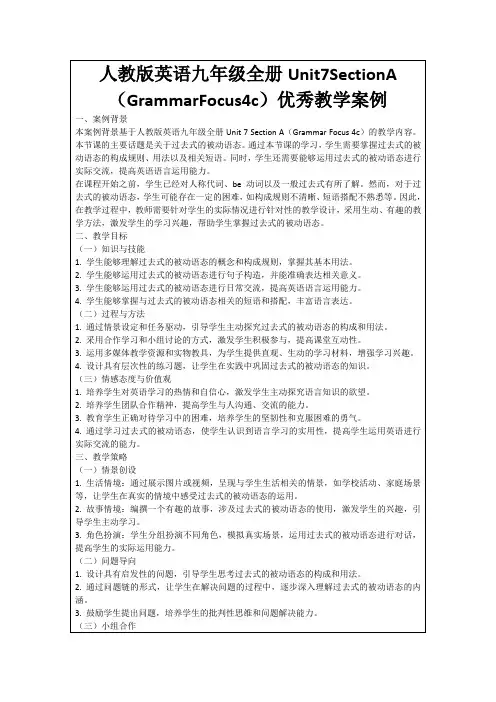
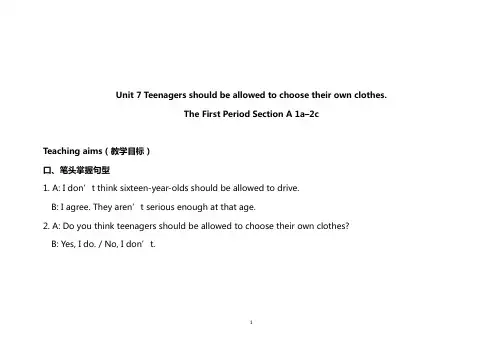
Unit 7 Teenagers should be allowed to choose their own clothes.The First Period Section A 1a–2cTeaching aims(教学目标)口、笔头掌握句型1. A: I don’t think sixteen-year-olds should be allowed to drive.B: I agree. They aren’t serious enough at that age.2. A: Do you think teenagers should be allowed to choose their own clothes?B: Yes, I do. / No, I don’t.13. Sixteen-year-olds should be allowed to get their ears pierced.4. He should stop wearing that silly earring.5. Students must not be allowed to have part-time jobs.熟练掌握词汇:smoke, license, safety. 了解下列词汇:pierce, earring技能目标:能用should/should not be allowed to do谈论应该被允许和不应该被允许做的事情。
情感态度:勇于发表自己的观点和意见,表达同意或不同意。
Difficulties(难点):be (not) allowed to doTeaching steps(教学步骤)21. Warm-up and revision(课堂热身)Show pictures of “Where are dads going?”Kid: Can I drive my friends to the mall?Dad: No, you are not allowed to drive.教学设计说明: 通过情景对话复习情态动词can并且引进新知be( not) allowed to2. Presentation(呈现新知识)呈现王磊和多多的对话练习句型结构3A:Teenagers should not be allowed to smokeB: I agree.教学设计说明:操练句型结构3. Work on 1a.T: Read the statements below. Circle A for agree or D for disagree.1. Teenagers should not be allowed to smoke.2. Sixteen-year-olds should be allowed to drive.3. Students should not be allowed to have part-time jobs.4. Sixteen-year-olds should be allowed to get their ears pierced.45. Teenagers should be allowed to choose their own clothes.4. Work on 1b.T: Listen and circle T for true or F for false.•Anna can go to the shopping center by bus.•Anna wants to get her ears pierced.•Anna wants to choose her own clothes.T:Listen again and complete the conversation.• A. be allowed to choose their own clothes• B. shouldn’t be allowed to get their ears pierced5• C. should be allowed to driveAnna: Mom, can I go to the shopping center with John? He just got his driver’s license. Mom: No way! I don’t think sixteen-year-olds ___________. I’m worried about your safety. Anna: But Gaby’s getting her ears pierced at the shopping center and I want to watch. Mom: Sixteen-year-olds __________________ either. They’re too young.Anna: I agree, but it’s fun to watch. Can I take the bus then?Mom: Well, OK.Anna: Great! I want to buy a new skirt, too.Mom: What kind of skirt? Maybe I should go with you.6Anna: Aww, Mom. I’m not a child. I think teenagers ____________________.Mom: Well, I just want to make sure you get something nice.观察与思考:请观察听力原文中的填写句子。

Unit 7 Teenagers should be allowed to choose theirown clothes.Teaching Aims:1. Knowledge Objects:Understand and correctly use the key words in this unit2. Ability Objects:Understand and master the use of “should (not) be allowed to do〞 .Use “(not) al lowed to do〞“I agree / disagree.〞or “ I don’t agree.〞to express one’s own ideas.3.Moral Objects:To develop a good habit and good moral character of abiding by rulesTeaching Key Poits:Vocabulary:smoke, pierce, license, safety, earring, cry, field, hug, lift, awful, teen, regret, poem, bedroom , community, chance, manage, society, unit, educate, professional, enter, supporttalk about, keep away from, make one’s own decision, get in the way ofTarget language:I don’t think sixteen-year-olds should be allowed todrive.I agree./ I disagree. I think sixteen is too young.Do you think teenagers should be allowed to work at night Yes, I do. / No, I don’t.Grammar:The Passive Voice “should be allowed to〞Teaching Difficult Points:Train students’ liste ning, speaking, reading and writing skills.Train students’ communicative competence.Teaching Times:Period One: Section A 1 (1a-2d)Period Two: Section A 2 (3a-3c)Period Three: Section A 3 (Grammar Focus-4c)Period Four: Section B 1 (1a-2e)Period Five: Section B 2 (3a-Self Check)The First PeriodSection A 1 (1a-2d)Teaching Aims and Demands:1. Knowledge ObjectsKey vocabulary:license safety smoke part-time pierce earring flashTarget language:I don’t think sixteen-year-olds should be allowed to drive.Teenagers should not be allowed to drive.2. Ability ObjectsTrain students’ listening skill.Train students’ communicative competence.3.Moral Objects:To make students understand each system of the social and family and know what shoud be done and what should not be done.Teaching Key points.Vocabulary and target languages.Teaching Difficult Points:Train students’ listening, reading and writing skills. Train students’ communicative competence.Teaching Procedure:I. PresentationAsk students: Do your parents allow you to watch TV Yes, they do.Present the sentence: You are allowed to watch TV.Teach “allow sb to do sth ““be (not) allowed to do sth〞“should (not)be allowed to do sth〞Present more sentence.Do your parents allow you to exerciseYes, they do.You are allowed to exercise.Do your parents allow you to smokeNo, they don’t.You are not allowed to smoke.Do your parents allow you to driveNo, they don’t.You are not allowed to drive.Do your parents allow you to choose your own clothes No, they don’t.You should be allowed to choose your own clothes.Do your parents allow you to get your ear piercedNo, they don’t.You should not be allowed to get your ear pierced.II. Warming upObey the school rules!As a teenager, you have a lot of rules at school. Can you write down some of themStudents should be allowed to speak English loudly.Students shouldn’t be allowed to sleep in class.Students shouldn’t be allowed to make noises.Students shouldn’t be allow ed to throw the rubbish in the classroom.Students shouldn’t be allowed to get to class late.Explain:allow sb to do sth允许某人做某事be allowed to do sth被允许做某事should be allowed to do sth应该被允许做某事1a. Read the statements below. Circle A for agree or D fordisagree.1. Teenagers should not be allowed to smoke.A D2. Sixteen-year-olds should be allowed to drive.A D3. Students should not be allowed to have part-time jobs.A D4. Sixteen-year-olds should be allowed to get their earspierced. A D5. Teenagers should be allowed to choose their own clothes.A DIII. Listening1b Listen and circle T for true or F for false.1. Anna can go to the shopping center by bus. T F2. Anna wants to get her ears pierced. T F3. Anna wants to choose her own clothes. T FIV. Practice1c Look at the statements in la and make conversations.A: I don't think sixteen-year-olds should be allowed to drive.B: I agree. They aren't serious enough.V. Key phrases1. be allowed to do 被允许去做2. the shopping center 购物中心3. driver’s license 驾驶执照4. sixteen-year-olds 16岁的孩子5. be worried about your safety 担忧你们的平安6. part-time jobs 兼职工作7. get their ears pierced 穿他们的耳朵8. their own clothes 他们自己的衣服9. serious enough 足够严肃VI. Listening2a What does Molly think of Kathy’s statements Listen and circle A for Agree,D for Disagree or DK for Doesn’t Know.Kathy Molly1. Sixteen-year-olds should not beallowed to work at night.2. Larry shouldn't work every night.3. He should cut his hair.4. He should stop wearing that sillyearring.5. He doesn't seem to have manyfriends. A D DKA D DKA D DKA D DKA D DK2b Listen again. What are Kathy’s and Molly’s reasons Number their reasons inthe correct order._____ It looks cool._____ Young people need to sleep._____ He needs to spend time with friends._____ He needs time to do homework._____ It doesn't look clean.VII. Practice1. 2c Make a list of things teenagers should and should not be allowed to do. Discuss your list with your partner. A: Do you think teenagers should...B: Yes, I .../No, I...2. 2d Read the conversation and answer the questions.1) Where do they go for school trip2) Does Mr. Smith allow students to take photos3) How to take photos3. Role-play the conversation.VIII. Summary1. Language pointsallow的用法1) Teenagers should be allowed to choose their own clothes.2) Teenagers should not be allowed to smoke.3) It is not allowed in the museum.4) Do you think we may be allowed to take photos if we don't use a flash以上四句都含有重要的句型be allowed to do sth.,其中第三句是此句型的一般现在时,一二四句是情态动词及此句型的混合使用。
Unit 7Teenagers should be allowed to choose their ownclothes.Section A (1a-2d)1.重点单词:license,safety,smoke,parttime,pierce,earring,flash2.重点短语:sixteen-year-olds3.重点句式:I don't think sixteenyearolds should be allowed to drive.I'm worried about your safety.Anna wants to get her ears pierced.I'm really excited about seeing the famous paintings by Picasso.Do you think we may be allowed to take photos if we don't use a flash?1.重点短语和句型2.含有情态动词的被动语态1.重点短语和句型2.含有情态动词的被动语态一、预习课本P49-50新单词并背诵,完成下面的汉译英。
1.证件________ 2.安全________3.吸烟________ 4.兼职的________5.刺破________ 6.耳环________7.闪光灯________二、认真预习1a-2d找出下列句型。
1.我认为16岁的青少年不应该被允许开车。
_______________________________________________________ _________________2.我担心你的安全。
________________________________________________________ ________________3.安娜想打耳孔。